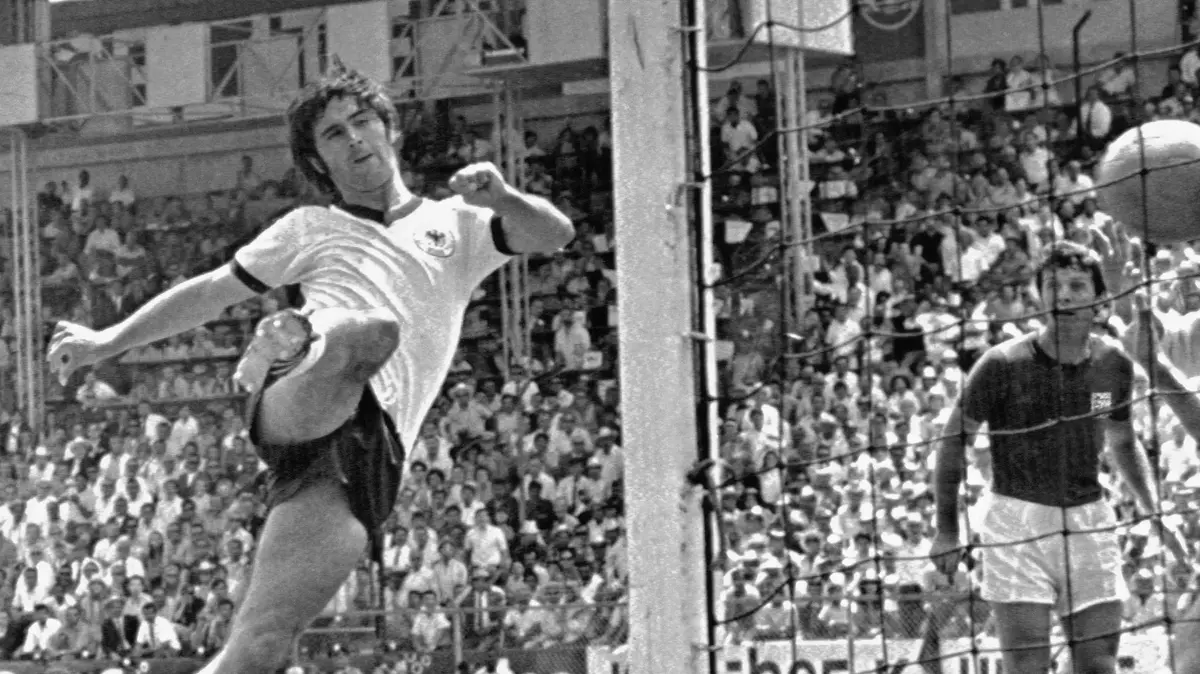Gerd Müller made his Bundesliga debut in the right-back position. Well, that's not entirely accurate, because he was destined to play in a separate derby against Munich 1860 in the first round in August 1965, but already in the first minutes right-back Adolf Konstbadel was injured. Exchanges were not yet in the constitution then, and coach Zeltko Tchaikovsky had to improvise. He shifted Muller to the home front and asked him to keep the fast left winger Hans Rabella. This task was admirably performed, and Bayern kept a clean sheet when playing in numerical inferiority against a superior opponent. The only ball penetrated her net in the first minute, and she lost only 1: 0. "I'm ready to take on any role," the 19-year-old explained at the time.
Later that season, which was Bayern's first in the Premier League, a dramatic game was played against Borussia Mönchengladbach in Munich.
The Bavarians led 2: 3 at the half, and Muller contributed cooking, but visiting genius Gunter Netzer gave a phenomenal performance at the link.
At the break, Tchaikovsky made a surprising move - he ordered Muller to keep a winger in the second half.
The result was great.
The playmaker was much less dominant, and Bayern easily won 2: 5.
Who knows what the history of Bayern and the West German team would have looked like without him.
Gerd Müller (Photo: AP)
From these examples two important things can be learned. First, Bayern did not fully internalize the qualities of Müller, who died yesterday at the age of 75, at the beginning of his career, because while everyone understood his scoring abilities, no one thought of moving him from the central striker position. Second, Muller was a whole player and much more diverse than the stigma that had taken root about him. It is commonly claimed that he was a broad beast who excelled at scoring "boring" goals - and nothing more. In practice, the German bomber has exceptional game wisdom, integrated well into the team lineup, participated in building moves off the field as well, and scored quite a few spectacular goals on every scale.
Take, for example, the rematch against Atletico Madrid in the 1974 Champions Cup. Muller decided this tackle with a double in the second half. The first was captured with a kick from an almost impossible angle, a missile for connections. The other he allowed a high and insane arc, while making a laugh at goalkeeper Miguel Reina, Papa's father, who was at that time one of the best in the world. The performance against Banik Ostrava in the 1976 Champions Cup, with a leap with a hallucinatory leap, was chosen as the goal of the year in Germany. Although his height was only 176 centimeters, Muller was characterized by a particularly fine head game, scoring more than 100 times with shots.
Even the mythical victory gate against the Netherlands in the 1974 World Cup final was phenomenal.
Read the history books, and many will describe it as a kind of daredevil, but watch it for yourself.
A flat wide ball reaches the field, and Muller stops it with one unexpected touch to take it back instead.
This deception throws off balance Rod Rod Carroll, one of the best defenders of his time, and causes goalkeeper Jan Jonahbloud to take a step in the wrong direction.
On the second touch, even before the two recovered, Muller sent a simple but unstoppable kick.
It was a combination of wisdom, elegance and technique at the highest level.
It was a performance that deserved to win the World Cup final.
More on Walla!
But in Germany: Gerd Müller died at the age of 75
"Bayern Munich would not have been the same team without Gerd Müller"
Custom insole - half an hour, and you go out into a new life
In the home World Cup, Muller "made do" with four goals, but two of them were critical. He was also the one to lift the West Germans to the final, 0-1 over Poland which actually became the semi-final at the end of the second houses stage. Two years earlier, he had won almost alone with doubles in both the semi-final against Belgium and the final against the United States, bringing the European Championship to the Germans.
For him, it was the compensation for the painful loss in the semi-finals of his most prolific tournament. Muller scored 10 goals in the 1970 World Cup in Mexico - the last player to do so to this day, but was dismissed under particularly dramatic circumstances. After scoring the winning goal in overtime against England in the quarter-finals, he bombed twice in overtime against Italy, and still came down undefeated 4: 3. "I will never forget it," he declared at the time, and even experienced a certain decline in fitness by his standards the following season, but came back big - and in 1971/72 set a record of 40 league goals, which had just been broken by Robert Lewandowski.
Earlier, in 2012, Leo Messi broke another Muller mythological record, scoring 91 goals in a calendar year. Muller bombed 85 times in 1972, but on average he is still the best of them all. The German reached his balance in 60 games, ie 1.41 per game, compared to 1.31 goals per game for the Argentine. This is also unusual in his terms, but overall Muller has maintained an average of a goal per game throughout his career. To his credit 68 conquests in 62 games in the national team uniform, and 563 goals in 605 appearances in the Bayern uniform.
Not for nothing did Franz Beckenbauer claim that the Bavarians would not have become a luxury club without their scorer. It is very difficult to overstate Muller's huge contribution to the Reds' climb, which he marched to four German championships and three Champions Cup wins, so it is amusing to recall that his joining Bayern was quite coincidental.
Müller was born and raised in Nordlingen, a small town closer to Nuremberg than Munich. As a child, he was an ardent fan of Nuremberg, which was considered a prestigious club, and especially admired striker Max Morlock, one of the heroes of winning the 1954 World Cup. On the other hand, the representatives of Munich in 1860 were very enthusiastic, and on one fateful day in 1964, senior representatives on its behalf intended to come to his house in Nordlingen and sign him.
1860 was then the senior team of Munich added to the founders of the Bundesliga in 1963.
Bayern were less attractive, playing in the second division, but believed in their chances of recruiting Müller into its ranks nonetheless.
When intelligence was received in her offices about the 1860s' visit to Gerd, Sports Director Walter Pemback decided to precede them by an hour and surprised the family.
After explaining how pink Müller's future at Bayern would be (or maybe red?), Pemback snuck out the back door, waited at a nearby restaurant until the end of the city rival's visit, and hoped for the best.
The striker's mother and brother thought he should join a bigger and richer club, but Gerd himself was under the impression that his chances would be better in the second division.
Defined as the best German of his time and entered a list that Muller is not sure is on.
In Knebauer (Photo: GettyImages)
It did not go easy, and Tchaikovsky did not really like his new young apprentice from the first moment. The coach defined him as "short and fat," and that nickname remained with Muller until the end of his career, only painted in a particularly cynical tone. Bayern president Wilhelm Neudker personally demanded to include the boy in the squad, and his feeling turned out to be correct. Muller scored 33 goals en route to a historic rise, and the legend began to be written. The tough Branco Zevetz, who came to Bayern in 1968, gave him helpful tips for upgrading his game, forced him to go on a diet, and together they won their first championship. From there, the road to fame was paved.
A significant portion of Mueller's goals were really "boring" - he just scored too much. Sturdy brakes tried to keep him and mow him down, but he found a way to break free of them, find the free spaces and continue to conquer, conquer and conquer. His thinking was faster, which is why his position was so brilliant. However, when the bullet reached him, he no longer used the brain, as he defined it. "If I start thinking in front of goal, I'll waste too much time," Muller stated. When it was necessary to subdue the goalkeeper, he used only his instincts. And those instincts were the best in the world.
Because of these instincts, somewhat paradoxically, it is customary to underestimate Mueller. His place as one of the greatest and most prolific strikers of all time is guaranteed, but not talked about in one breath with the greatest footballers ever. Beckenbauer is defined as the best German of his time, and if you ask commentators to determine the list of the 25 best players in history, it is likely that Muller's name will not appear in it. And it's a matter of taste, of course, but it would be a big mistake to categorize Muller as a "limited" player who knew "only" to score. He was much more than that, and the work of the man who passed away yesterday at the age of 75 should be more appreciated. He really was one of the best ever, and not just among the pioneers.
Follow Yochin on Facebook












